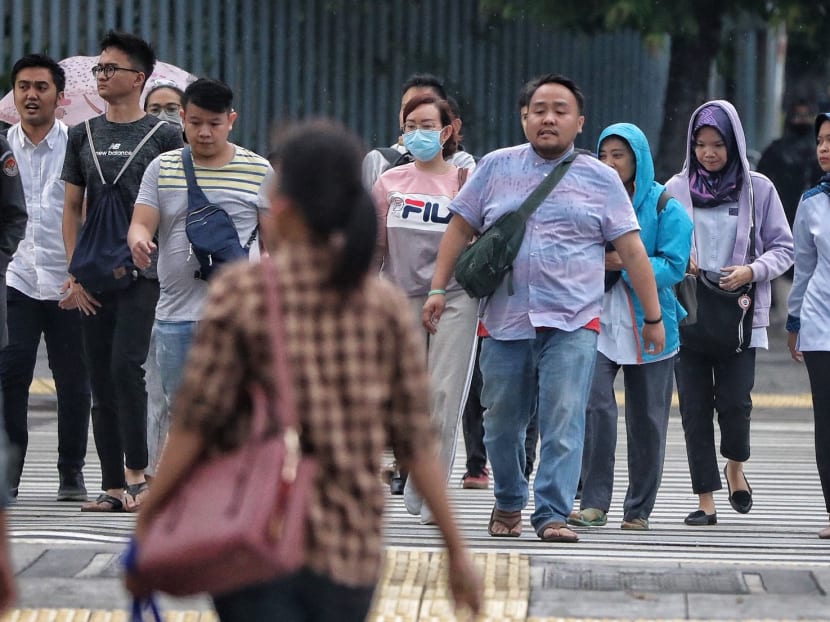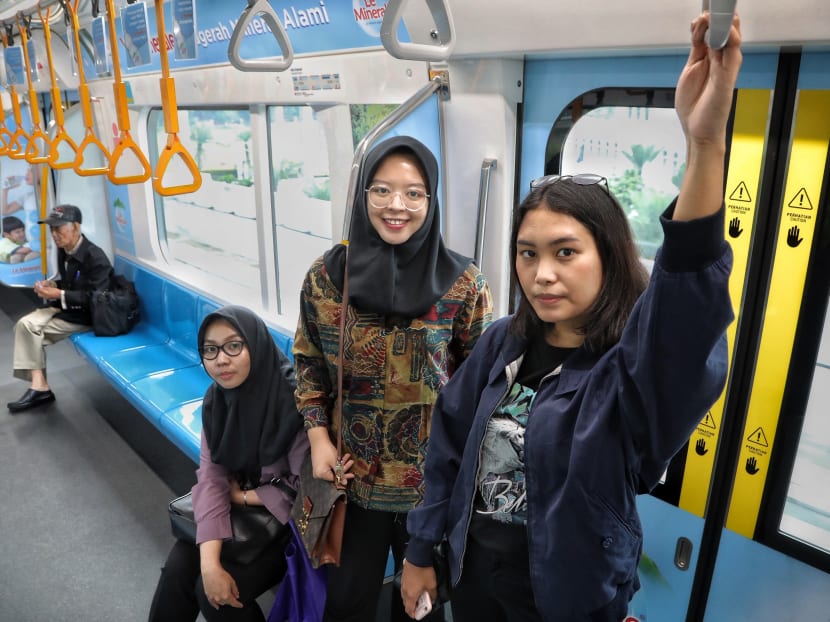17 million first-time voters hold key to Indonesia’s presidency
JAKARTA — Among some 192 million Indonesians who will be heading to the ballot box on Wednesday (April 17), more than 17 million are first-time voters aged 17 to 20.

The 17 million first-time voters are part of a larger group of 80 million millennials aged between 17 and 35, which make up about 40 per cent of the electorate.
JAKARTA — Among some 192 million Indonesians who will be heading to the ballot box on Wednesday (April 17), more than 17 million are first-time voters aged 17 to 20.
Their vote could prove to be crucial in determining the outcome of the presidential election — provided they cast their ballots.
The presidential poll, which has largely overshadowed the elections for provincial legislatures and district/city councils, will see a rematch between incumbent president Joko Widodo, 57, and 67-year-old challenger Prabowo Subianto.
Mr Widodo, better known as Jokowi, narrowly defeated Mr Subianto, an ex-general in the Suharto era, by 6 percentage points in the last polls.
For 19-year-old journalism student Felisitasya, she will cast her vote based on the candidates’ campaign promises, their political experience, their background and their attitude towards the people during the hustings.
Ms Felisitasya, who expressed support for Mr Widodo, added: “As a first-time and young voter, I want my voice to be heard in this election. I want to choose a leader who I think can lead the country better.”
Political science undergraduate Wiwin Sunardi, 22, who feels that Mr Subianto has the “tenacity and gravitas to lead the country better”, said that it is important for first-time voters and the youth to exercise their right to vote.
“We fought for our independence so that we can chart our own future. That involved having the right to choose our leaders,” said Mr Sunardi, who is concerned about the country’s slowing economy and technological development.
“So, it would be a waste if we don’t use that right.”
A GROUP WITHOUT A SINGLE IDENTITY
The first-time voters are part of a larger group of 80 million millennials aged between 17 — the minimum voting age in Indonesia — and 35, that is about 40 per cent of the electorate.
But they do not have a “single identity” as the issues that concern them depend on whether they come from urban or rural areas, said Ms Titi Anggraini Mashudi, the executive director of non-governmental organisation Election and Democracy.
Millennials from rural areas, for instance, would worry about the prices of goods, employment and salaries. On the other hand, those living in urban areas would be concerned about things like democracy, injustice, economic issues and the standard of education and healthcare, she said.
“There’s a difference in their mindsets. Perhaps, it’s because there’s greater Internet penetration in urban areas, allowing the young folks to be exposed and influenced by what they read and watch,” she added.
As communication science undergraduate Nadhira Arundari, 21, said: “I’m an undergraduate, so the issue of cost of living is not a top concern. I’m more interested in how the leaders can address the issues of human rights and feminism.”

From left: Dwi Ayannisa, 24, Nadhira Arundari, 21, and Maharani Savitri, 23. The first-time voters are excited about the upcoming Indonesian presidential elections on April 17. Photo: Raj Nadarajan/TODAY
ATTEMPTS TO WOO THEM
Political analysts pointed out that since hustings began late last year, both presidential candidates have made attempts to woo young voters.
Mr Widodo has been seen wearing sneakers and even recently appeared in a video singing rock group Queen’s Bohemian Rhapsody.
Mr Subianto, meanwhile, chose young billionaire Sandiaga Salahuddin Uno to be his running mate, touting him as a role model for young Indonesians aspiring to set up their own businesses.
But Dr Alexander Arifianto, a research fellow who studies Indonesian politics at the Singapore-based S Rajaratnam School of International Studies (RSIS), noted that during the hustings, both candidates did not substantively address youth concerns such as unemployment, human rights and lesbian, gay, bisexual and transgender (LGBT) issues.
“So, it would not be a surprise if some do not vote because they do not feel any of the candidates are really representing their interests and issues they care about,” he added.
WHY SOME ARE NOT VOTING
In the last few weeks, there has been a growing movement among some Indonesians who declared that they will abstain from voting in the presidential polls.
They are known as “golput” or “Golong Putih” (white group) in the country’s national language Bahasa Indonesia — voters who will submit the white portion of the voting slip to indicate that they did not choose either candidate.
The abstention rate in Indonesia has soared since the 1999 polls. In the 2004 presidential election, 23 per cent abstained from voting, and this rose to 30 per cent in the last polls in 2014.
A survey by independent pollster Indikator Politik published in January showed that at least 20 per cent of voters are going to abstain in the upcoming presidential election.
For those who said they will not vote, the reasons are varied: Candidates providing no new solutions, unfulfilled promises, as well as what they called a “corrupt political scene”.
Political apathy is also an issue. A survey published in January by the IDN Research Institute and Jakarta-based pollster Alvara Research Centre showed that only 23.4 per cent of the 1,400 millennial respondents followed political news or kept up with political issues.
Law undergraduate Ikhsan Luthfi, 22, said he will not vote, pointing out that both presidential candidates in this year’s polls are more into “political grandstanding, making stale promises and ideas which they sold to voters five years ago”.
“I do not think that it is a wasted opportunity if I don’t vote because the country’s future is not just decided through elections. It’s more than that,” he said. “Building awareness regarding the social situation that occurs today by organising movements is far more important for Indonesia's democracy going forward.”
Ms Felisitasya disagrees. The “golput” movement, she said, is started by people who think that Indonesia could only be managed by their ideal concept of a leader, without taking into account reality.
“Those who abstain show a lack awareness on the significance of what it means to be a leader and how the leader can bring a country forward despite the difficulties faced,” she said.
Mr Alfarhat Pratama, 21, who is studying for a degree in international relations, said that he will not vote because he believes that both candidates are not interested in improving the lives of the people.
“The government today does not side with the people but the elites who support them. By not voting, we hope to generate awareness and critical thinking among the masses that they should not be fooled by the elites,” he said.
“Not voting is not a loss to me, especially when I’m faced with the choice of having to choose one demon over the other.”






